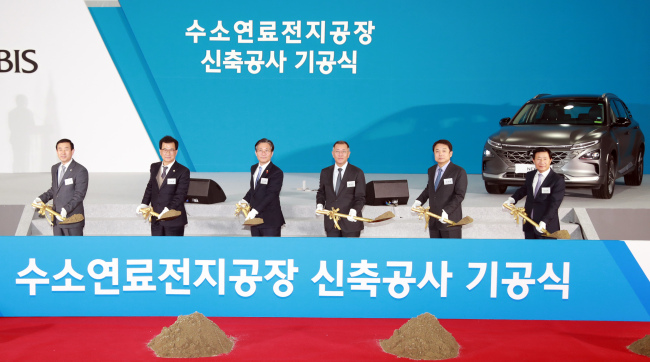Hyundai to invest W7.6tr in FCEVs, up production of fuel cell stacks
By Kim Bo-gyungPublished : Dec. 11, 2018 - 15:22
CHUNGJU, North Chungcheong Province -- Hyundai Motor Executive Vice Chairman Chung Eui-sun on Tuesday introduced the automaker’s long-term plan to manufacture 500,000 units of fuel cell electric vehicles here annually by 2030 in an effort to overtake rivals Japan and China in the FCEV market.
With these goals in mind, Hyundai Mobis, the auto parts supplier, held a groundbreaking ceremony for its second hydrogen fuel cell stack factory, which when complete is expected to produce stacks for some 40,000 FCEVs by 2022, the company said. This is about 13 times its current production capacity.
The facility expansion is part of plans by Hyundai Motor and some 124 partners to invest an accumulated total of 7.6 trillion won ($6.7 billion) in research and development between now and 2030 and to create 51,000 jobs.
“About 99 percent of parts used in FCEVs are sourced within the country, so the business will send a ripple effect among related sectors. In joint investment with partner companies, we will form the foundation for a new growth engine in the auto industry,” Chung said at the groundbreaking ceremony in Chungju.

“In the upcoming hydrogen economy, as the first mover in the new sector, Hyundai Motor will take the lead in the hydrogen society, where hydrogen is a key source of energy.”
Also present at the event were some 120 officials, including Minister of Trade, Industry and Energy Sung Yun-mo, Gov. Lee Si-jong of North Chungcheong Province, Hyundai Motor President Chung Jin-haeng and Hyundai Mobis President Lim Young-deuk.
To diversify its business portfolio, the company also plans to supply stacks to companies across a wide range of sectors, including logistics and electricity businesses.
Global consulting firm McKinsey has predicted that demand for fuel cell stacks will range between 5.5 million and 6.4 million by 2030. Due to convenient charging, McKinsey added, fuel cells will reduce logistics ownership costs 10 percent during the same time frame.
In the race among automakers to gain a foothold in future mobility, which largely depends on competitiveness in EVs and FCEVs, Hyundai Motor is tightening its grip on FCEVs and now boasts the longest driving ranges and the most convenient charging times.
In 2013 Hyundai mass-produced the industry’s first FCEV, the Tucson ix, and earlier this year came out with the Nexo FCEV with a 609-kilometer driving distance on a single charge.
Hyundai’s ambition to take over the FCEV market is facing obstacles due to the lack of government-led initiatives. In this regard, South Korea lags behind China, which aims to supply 1 million FCEVs by 2030; and Japan, which hosted the first Hydrogen Energy Ministerial Meeting ahead of the G20 summit last month.
The new factory will occupy 16,600 square meters within Mobis’ eco-friendly auto parts production factory in Chungju, and construction is scheduled for completion by the end of 2019.
Hyundai Mobis opened its first stacks factory here last year with the capacity to produce stacks for some 3,000 FCEVs, the company said.
By Kim Bo-gyung (lisakim425@heraldcorp.com)







![[KH Explains] Hyundai's full hybrid edge to pay off amid slow transition to pure EVs](http://res.heraldm.com/phpwas/restmb_idxmake.php?idx=644&simg=/content/image/2024/04/18/20240418050645_0.jpg&u=20240419100350)






![[From the Scene] Monks, Buddhists hail return of remains of Buddhas](http://res.heraldm.com/phpwas/restmb_idxmake.php?idx=652&simg=/content/image/2024/04/19/20240419050617_0.jpg&u=20240419175937)

![[KH Explains] Hyundai's full hybrid edge to pay off amid slow transition to pure EVs](http://res.heraldm.com/phpwas/restmb_idxmake.php?idx=652&simg=/content/image/2024/04/18/20240418050645_0.jpg&u=20240419100350)

![[Today’s K-pop] Illit drops debut single remix](http://res.heraldm.com/phpwas/restmb_idxmake.php?idx=642&simg=/content/image/2024/04/19/20240419050612_0.jpg&u=)